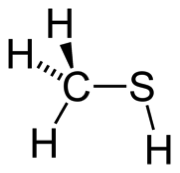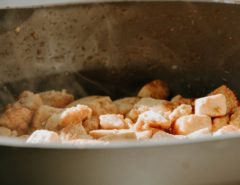BY: MORGAN REASE
 If you attended public schools in the United States as a child, I’m sure you learned of Benjamin Franklin, one of our nation’s founding fathers and a man of great curiosity and intellect. You probably recall his infamous kite experiment, but you probably didn’t learn that he wrote a letter to the Royal Academy of Brussels questioning why the world’s top minds were so focused on the pretentious rather than solving practical problems…like stinky farts and bad breath.
If you attended public schools in the United States as a child, I’m sure you learned of Benjamin Franklin, one of our nation’s founding fathers and a man of great curiosity and intellect. You probably recall his infamous kite experiment, but you probably didn’t learn that he wrote a letter to the Royal Academy of Brussels questioning why the world’s top minds were so focused on the pretentious rather than solving practical problems…like stinky farts and bad breath.
Each year the Royal Academy offered a prize to the scientist who could answer that year’s prize question. An excerpt from Franklin’s letter to the Royal Academy reads, “My Prize Question therefore should be, To discover some Drug wholesome & not disagreable, to be mix’d with our common Food, or Sauces, that shall render the natural Discharges of Wind from our Bodies, not only inoffensive, but agreable as Perfumes.” (6)
Franklin’s letter cites the offensive odors produced by eating asparagus, onions, and beans as problems facing mankind that could be solved by science. Surely after 200 years we can answer his prize question!
The odorous nature of urine after consuming asparagus has been thoroughly documented in popular culture and has been heavily studied by the world’s top minds. Documentation of asparagus consumption dates back for thousands of years (4). However, it seems that it wasn’t until the 1700s that writings mention any relation between asparagus consumption and urine odor.
So, what causes this foul odor? The unusual aroma that results from eating asparagus is due to sulfur compounds being expelled in the urine. Primarily, what you are smelling is methanethiol, dimethyl sulfide, dimethyl sulfoxide, and dimethyl sulfone (1), which are metabolic breakdown products of asparagusic acid (1,2-dithiolane-4-carboxylic acid) — a compound unique to asparagus.




From left to right: methanethiol, dimethyl sulfide, dimethyl sulfoxide, dimethyl sulfone
However, not everyone is affected by these aromatic urine streams after eating asparagus. The genes for producing pungent aromas are inherited in an autosomal dominant fashion (if one of your parents passes the gene to you, you produce the aroma) (5). Additionally, some people have an anosmia (an inability to smell something very specific) and can’t detect the aroma (4). So you might have stinky pee and not even know it!
Garlic breath (okay okay, I know. Franklin’s original letter talks about onion breath, but the principle is the same and my sources are discussing garlic breath, so deal with it.) is purported to be a horribly offensive thing — ruining dates, destroying the chances of interviewees, etc. But, unlike the case of asparagus and smelly pee, genetics is not a factor in odor production here. We’re all on equal footing as we expel another assortment of sulfur compounds into the air. Alliin and allicin are compounds found in garlic that are are broken down into another cocktail of sulfurous aromas after consumption. Garlic breath is mainly the mixture of diallyl disulfide, allyl methylsulfide, allyl mercaptan, and allyl methyldisulfide. (1,7) Not only do these compounds worsen your breath, but they are excreted through your pores and urine as well! Doesn’t that (literally) stink?
![]()
![]()
![]()
![]()
From left to right: diallyl disulfide, allyl mthylsulfide, allyl mercaptan, allyl methyldisulfide
Luckily there are ways to mitigate the undesirable aromas associated with garlic breath. Thanks to some food scientists at Ohio State, we now know that consumption of certain fruits and vegetables after consuming garlicky foods can dramatically reduce the intensity of garlic breath compounds (and not just by masking them). Foods found to inhibit garlic breath were fruits like apples, plums, cherries, mint, basil, lettuce, potato and more. It is theorized that the polyphenol oxidase enzyme (the same enzyme that causes cut fruit to brown) along with other reactive phenolic compounds, cause the odorous garlic compounds to be chemically changed into other, less stinky compounds. (3)
“Beans, Beans, the magical fruit, the more you eat the more you toot” – Hippocrates
Okay, Hippocrates probably didn’t say that. But eating beans has been shown to increase your gas production. The reason for this phenomenon is actually very similar to lactose intolerance. People don’t have the right enzyme to break down the carbohydrate they’re consuming! Beans contain medium-chain carbohydrate sugars, known as oligosaccharides, called raffinose and stachyose that are not digestible by the human gut as we lack the enzyme alpha-galactosidase to break them down into their composite sugars. (1) So, like other foods that are indigestible by our own enzymes, our microbial gut flora step in to help us out. The microbes in your gut break down these sugars into their base components, and producing a lot of gas in the process.


From left to right: raffinose, stachyose
Beano, the popular gas-reducing tonic, is actually just alpha-galactosidase and invertase (another enzyme) to break down the sugars before the foods reach the gas producing bacteria, and thus mitigate flatulence.
So there you have it, Benjamin Franklin I’m sure would love knowing that his inquiry was eventually answered after all.
Sources
- Brunning, Andy. Why Does Asparagus Make Your Pee Smell?: Fascinating Food Trivia Explained with Science. Berkeley, CA: Ulysses, 2016. Print.
- Hansanugrum, Areerat, and Sheryl A. Barringer. “Effect of Milk on the Deodorization of Malodorous Breath after Garlic Ingestion.” Journal of Food Science. Blackwell Publishing Inc, 17 Aug. 2010. Web. 26 Mar. 2017.
- Mirondo, Rita, and Sheryl Barringer. “Deodorization of Garlic Breath by Foods, and the Role of Polyphenol Oxidase and Phenolic Compounds.” Journal of Food Science. N.p., 20 Sept. 2016. Web. 26 Mar. 2017.
- Mitchell, S. C. “Food Idiosyncrasies: Beetroot and Asparagus.” Drug Metabolism and Disposition: The Biological Fate of Chemicals.S. National Library of Medicine, Apr. 2001. Web. 26 Mar. 2017.
- Mitchell, S. C., R. H. Waring, D. Land, and W. V. Thorpe. “Odorous Urine following Asparagus Ingestion in Man.” U.S. National Library of Medicine, 15 Apr. 1987. Web. 26 Mar. 2017.
- “The Royal Academy of Farting.” Teaching American History. N.p., n.d. Web. 26 Mar. 2017.
- Singh, Maanvi. “Science Of Stink: Blame Sulfur Compounds For Your Garlic Breath.” NPR. NPR, 21 June 2014. Web. 26 Mar. 2017.
- Stromberg, Joseph. “Why Asparagus Makes Your Urine Smell.” com. Smithsonian Institution, 03 May 2013. Web. 26 Mar. 2017.






Leave a Reply